soldiers
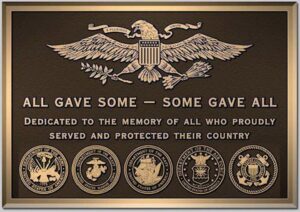
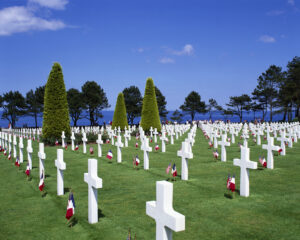 Memorial Day is a different kind of day, because it is not a holiday of celebration, but rather a day remembrance. We cannot celebrate this day, because it is about honoring those soldiers who went to war and didn’t make it back. It was the ultimate sacrifice. As the saying goes concerning soldiers, “all gave some, but some gave all!” When a soldier goes to war, they know. They are very aware that the possibility exists that they will not come back home. They know that their sacrifice might be the ultimate sacrifice. They want to make it home, but they know it may not be. Today is about those soldiers who did not make it home.
Memorial Day is a different kind of day, because it is not a holiday of celebration, but rather a day remembrance. We cannot celebrate this day, because it is about honoring those soldiers who went to war and didn’t make it back. It was the ultimate sacrifice. As the saying goes concerning soldiers, “all gave some, but some gave all!” When a soldier goes to war, they know. They are very aware that the possibility exists that they will not come back home. They know that their sacrifice might be the ultimate sacrifice. They want to make it home, but they know it may not be. Today is about those soldiers who did not make it home. 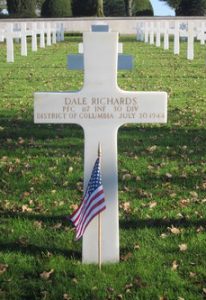
I doubt if there are many families that can say that they have never lost a soldier in battle, but while I don’t specifically know of any in my family, I’m sure there are some back there a way. There have been many wars, and with each one examined, comes the increased chance of having a relative who dies at war. It doesn’t matter anyway, because Memorial Day is a day to honor those who gave all, whether they are related to us or not. Their sacrifice is what makes us free today. They fought for people they didn’t even know, gave up time with the family they loved, and died in a place they didn’t want to be. That is the epitome of bravery and courage.
Some of them, including my uncle, Jim Richards’ brother Dale Richards never left the place they died. Dale fought in Normandy, France, and that is where he is to this day. The people of France are so grateful for the soldiers who fought and died over there, that they keep the graves looking beautiful. It’s nice to know that there are people who continue to show their appreciation for those men who “gave all” for them. Their sacrifice should never be forgotten. Their families can certainly never forget. They have had to go forward with their lives without the love and support of the soldier that went to war and never came home. That soldier had 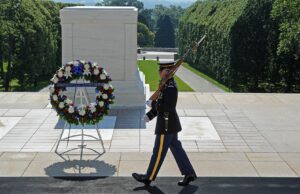
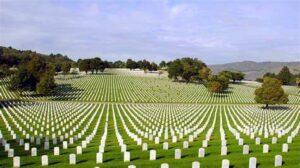 potential. They could have been anything they wanted to be, but instead, they chose to give their life to ensure the freedom of other human beings. Today, we honor all of those men who “gave all” for us and so many others. We thank you for your service, and we honor your memory. God bless you all, from a grateful nation.
potential. They could have been anything they wanted to be, but instead, they chose to give their life to ensure the freedom of other human beings. Today, we honor all of those men who “gave all” for us and so many others. We thank you for your service, and we honor your memory. God bless you all, from a grateful nation.
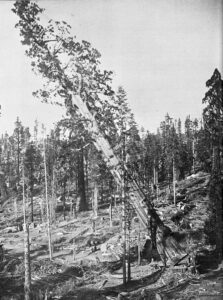
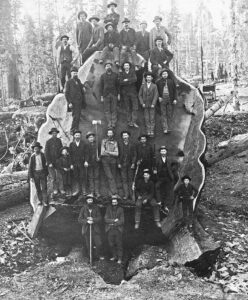 If you have ever wondered about the stupid things people can do, consider this. Most people have heard about the Redwoods in California. Trees just seem to grow much bigger in California, and if you have ever toured the Redwood National and State Parks, you will know what I mean. There is also a Sequoia National Park, and bordering that the Kings Canyon National Park, which was the location of the Mark Twain Tree…a giant sequoia tree located in the Big Stump Forest of Kings Canyon National Park. The giant tree was named after the American writer and humorist Mark Twain. The tree stood 331 feet tall and stretched 16 feet in diameter. It was an amazing tree, but there were people back East and in Europe who did not believe that trees could grow that big. In the late 1800s, travel across the country or from Europe just to see a big tree, was apparently not feasible. Now, I get that it could be difficult, and I get that the government wanted to prove that the tree existed, but what they did was no more than a display of stupidity.
If you have ever wondered about the stupid things people can do, consider this. Most people have heard about the Redwoods in California. Trees just seem to grow much bigger in California, and if you have ever toured the Redwood National and State Parks, you will know what I mean. There is also a Sequoia National Park, and bordering that the Kings Canyon National Park, which was the location of the Mark Twain Tree…a giant sequoia tree located in the Big Stump Forest of Kings Canyon National Park. The giant tree was named after the American writer and humorist Mark Twain. The tree stood 331 feet tall and stretched 16 feet in diameter. It was an amazing tree, but there were people back East and in Europe who did not believe that trees could grow that big. In the late 1800s, travel across the country or from Europe just to see a big tree, was apparently not feasible. Now, I get that it could be difficult, and I get that the government wanted to prove that the tree existed, but what they did was no more than a display of stupidity.
So, the solution was hatched. In 1891, the US Army arrived in California. Their mission was simple. Cut down 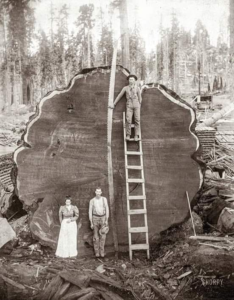 the famous Mark Twain tree so that slices of it could be sent to the American Museum of Natural History. In what is now Kings Canyon National Park, soldiers approached the giant sequoia tree and promptly cut it down. The tree, well known as it was, inspired wonder and doubt from those who had heard about it. Slices of the Mark Twain Tree were sent back to the East Coast and Europe, where it was displayed at museums in New York and London.
the famous Mark Twain tree so that slices of it could be sent to the American Museum of Natural History. In what is now Kings Canyon National Park, soldiers approached the giant sequoia tree and promptly cut it down. The tree, well known as it was, inspired wonder and doubt from those who had heard about it. Slices of the Mark Twain Tree were sent back to the East Coast and Europe, where it was displayed at museums in New York and London.
The project took 13 days and was carried out by lumbermen Bill Mills and SD Phips, with assistance from Barney and John Lukey. The tree was later shipped to the American Museum of Natural History in New York and the British Museum in London at the expense of Collis P Huntington, the president of the Southern Pacific Railroad. I suppose it is easy enough to understand why people couldn’t believe the huge trees were real. And for the Sequoia trees, even though the Sequoia National Park was established in 1890, access to the sequoia groves was difficult and the existence of such large trees was not widely believed at the time. I suppose some people might think that could justify the actions of the US Army and the US government, but to me it was a travesty, and a complete display of stupidity. So, to prove the tree could grow that big, they killed it, so they couldn’t see how big it could really grow. All to prove a point, 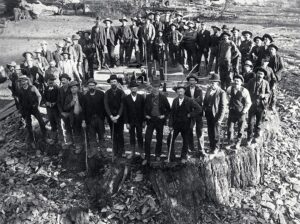
 because there were those who thought the story was bogus.
because there were those who thought the story was bogus.
Today, you can see the Mark Twain stump, and the other remains of the tree, which are preserved as part of the Big Stump Picnic Area in Kings Canyon National Park. The stump is near the entrance to Grant Grove. The stump stands there as a monument to the stupidity of some men.
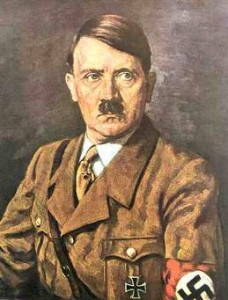
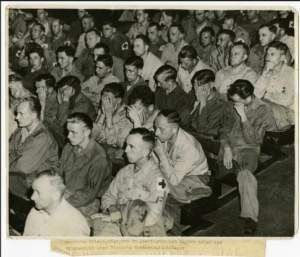 Adolf Hitler was quite possibly one of the most insane people of all time, but apparently much of the hateful things he did were actually done under the influence of Opioids and Meth. Does that excuse his behavior? Absolutely not. Even on opioids and meth, there was a monster that existed deep on the inside of that man. There was a deep-seated hatred that made him do the things he did. The opioids and meth merely gave him the ability to continue on in his hatred, and it wasn’t just Hitler that was regularly using these drugs to carry out their hateful tasks. It is common knowledge that many of the soldiers under Hitler either didn’t know the truth of everything that was going on, and still others were afraid to argue the point for fear of their own death. For many of those people, the use of drugs was the only escape from the horrors of what they had to do.
Adolf Hitler was quite possibly one of the most insane people of all time, but apparently much of the hateful things he did were actually done under the influence of Opioids and Meth. Does that excuse his behavior? Absolutely not. Even on opioids and meth, there was a monster that existed deep on the inside of that man. There was a deep-seated hatred that made him do the things he did. The opioids and meth merely gave him the ability to continue on in his hatred, and it wasn’t just Hitler that was regularly using these drugs to carry out their hateful tasks. It is common knowledge that many of the soldiers under Hitler either didn’t know the truth of everything that was going on, and still others were afraid to argue the point for fear of their own death. For many of those people, the use of drugs was the only escape from the horrors of what they had to do.
Still, there were many people who were truly evil, and it’s quite likely that those people simply used the drugs to “enhance” the horrific experience, and by enhance, I mean they very much enjoyed the killing and in their twisted minds, the use of the drugs made it more “pleasurable” to do the things they did. The drugs also kept the Nazis awake for many more hours than they might otherwise have been able to endure. The Nazi call was “Germany awake!” The orders were constantly barked out, and they meant it more than most people even knew. As Nazi Germany battled its way through World War II, the country relied on a little secret to stay “energetic.” It was known as Pervitin. It was used by the soldiers to avoid sleep and to numb the terror of battle. Housewives later popped Pervitin so they could “finish all their chores and lose weight” too. It turns out, however, that it was just pure methamphetamine. And Adolf Hitler himself relied on even stronger remedies, taking a drug called Eukodal, effectively a cocktail of oxycodone and cocaine, to treat various “ailments.”
By 1941, a top German health minister wrote a letter fretting that the entire nation was “becoming addicted to drugs” but it made little difference to Hitler or anyone else. Indeed, there remains a “trove of weird historical facts about drug use in Nazi Germany” that would totally astound even World War II buffs. We already knew that Hitler was evil and crazy, but now we know more about how he was able to keep going with all his hate. 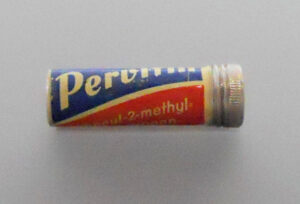
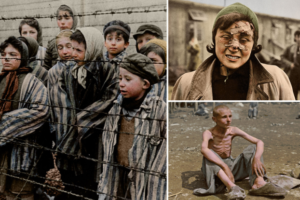 For some or most of the soldiers, it was likely a way to control what they did. I’m sure a ‘mutiny” would have been catastrophic for Hitler’s master plan against the Jews. When some of those soldiers saw the atrocities that occurred, they actually wept. Many of them had no idea what was really going on…and I’m sure that was exactly what Hitler wanted.
For some or most of the soldiers, it was likely a way to control what they did. I’m sure a ‘mutiny” would have been catastrophic for Hitler’s master plan against the Jews. When some of those soldiers saw the atrocities that occurred, they actually wept. Many of them had no idea what was really going on…and I’m sure that was exactly what Hitler wanted.
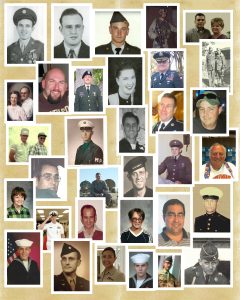 Where would a nation be without its soldiers? In deep trouble. Our world, at this time in history is at its most volatile. To top it off, being in the service has been voluntary for a long time now. That means two things. First that fewer people might be entering the service; and second, that the ones who join, want to be there and will work harder. Being in the service is an often-thankless job with long hours at times, and months or even years away from family when necessary. Our soldiers are at the beck and call of the commander-in-chief. It would be nice if our world could live together in peace and harmony, but that has never and will never be…until the end of time. Until then, we need them.
Where would a nation be without its soldiers? In deep trouble. Our world, at this time in history is at its most volatile. To top it off, being in the service has been voluntary for a long time now. That means two things. First that fewer people might be entering the service; and second, that the ones who join, want to be there and will work harder. Being in the service is an often-thankless job with long hours at times, and months or even years away from family when necessary. Our soldiers are at the beck and call of the commander-in-chief. It would be nice if our world could live together in peace and harmony, but that has never and will never be…until the end of time. Until then, we need them.
There are several types of soldiers, and I don’t mean branches of the military, although there are those too. We have Army, Navy, AirForce, and Marines, as well as Coast Guard and National Guard, but the types I am referring to are Killed in Action, active duty, and Veterans and retirees. With that, there are also special days of remembrance for soldiers. For those killed in action, there is Memorial Day. For active-duty soldiers, there is Armed Forces Day, and for veterans and retirees, there is Veterans Day.
For those who are veterans, we take this opportunity to thank them for their service and their sacrifice, because they did sacrifice. They left their families at home and went out to fight for people they don’t even know, and probably never will. We, here at home, have no way to really repay them for their acts of selflessness, so all we can do is thank them for their service. Somehow, it just doesn’t seem enough. How could we possibly repay them? We can never give them back the lost time with family, the memories, the births of children, and the multiple firsts that go with them. Those things are gone forever for the soldier, because they 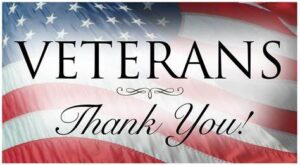 chose to go out and protect their country, and the people in it. It is a debt that we, as mere citizens, can never repay. All we can do is be grateful, because our lives are what they are because of a soldier. Yes, we are grateful to the active-duty soldiers currently protecting us, and we pray every day that they will get to come home to their families one day, and become a veteran or retiree, but today is for that special group. The ones who served, and then went back to their lives and tried to pick up where they left off, or at least start the next step. To you I say, Happy Veterans Day, and thank you so much for your service. We are forever grateful!!
chose to go out and protect their country, and the people in it. It is a debt that we, as mere citizens, can never repay. All we can do is be grateful, because our lives are what they are because of a soldier. Yes, we are grateful to the active-duty soldiers currently protecting us, and we pray every day that they will get to come home to their families one day, and become a veteran or retiree, but today is for that special group. The ones who served, and then went back to their lives and tried to pick up where they left off, or at least start the next step. To you I say, Happy Veterans Day, and thank you so much for your service. We are forever grateful!!
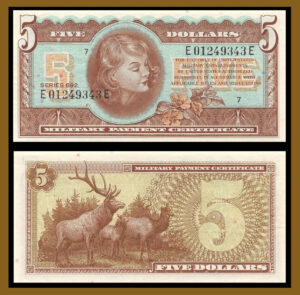 During World War II, and through the Vietnam War, the United States government was facing a situation with the US dollar that was different from prior years. It’s not something we really think about much, but it had to do with the fact that the countries the US Military was in were unsure of how their money was going to play out if they were one of the countries that fell. The dollar was stable, so they were happy to take payment in the US dollar over their own currency. In fact, the local civilians often accepted payment in dollars for less than the accepted conversion rates, meaning that they lost money in the deal. Dollars became more favorable to hold, which further inflated the local currencies, defeating plans to stabilize local economies. On top of that, troops were being paid in dollars, which they could
During World War II, and through the Vietnam War, the United States government was facing a situation with the US dollar that was different from prior years. It’s not something we really think about much, but it had to do with the fact that the countries the US Military was in were unsure of how their money was going to play out if they were one of the countries that fell. The dollar was stable, so they were happy to take payment in the US dollar over their own currency. In fact, the local civilians often accepted payment in dollars for less than the accepted conversion rates, meaning that they lost money in the deal. Dollars became more favorable to hold, which further inflated the local currencies, defeating plans to stabilize local economies. On top of that, troops were being paid in dollars, which they could 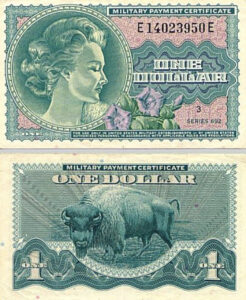 convert in unlimited amounts to the local currency with merchants at the floating (black market) conversion rate, which was much more than the government fixed conversion rate. It was rather a great money-making proposition, but really wasn’t ethical. This conversion rate imbalance allowed the servicemen to profit from the more favorable exchange rate.
convert in unlimited amounts to the local currency with merchants at the floating (black market) conversion rate, which was much more than the government fixed conversion rate. It was rather a great money-making proposition, but really wasn’t ethical. This conversion rate imbalance allowed the servicemen to profit from the more favorable exchange rate.
While anyone could understand how people would want to make money if they can, it was really going to be damaging to the local economy in the end. The MPCs were designed to stop the unfair conversion rate of currency. The scrip (MOCs) was changed out periodically, to avoid hoarding. Once they came out with a new version of scrip, the prior version became worthless. Another way they were supposed to eliminate the problem was that MPCs were only allowed to be used by military personnel in military facilities and approved locations. As a safeguard, if the MPCs 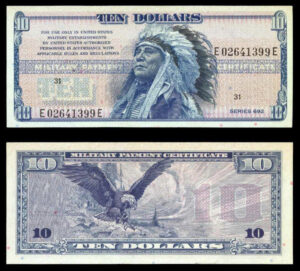 were converted to local currency, they were not allowed to be reconverted to MPCs, so the plan was useless. US MPCs were in use from 1946-1973 and were used in all overseas military locations.
were converted to local currency, they were not allowed to be reconverted to MPCs, so the plan was useless. US MPCs were in use from 1946-1973 and were used in all overseas military locations.
I was actually watching an episode of MASH this morning about this very thing. The men were buying up the old scrip from people who couldn’t get to the exchange. Of course, they bought it for less than its value, planning to cash in when they turned it in for its face value. The solution for that problem was that the military personnel were restricted to the base on C-Days…currency exchange days. I don’t know how much of the fraudulent exchanges were stopped in this way, but it might have stopped some.
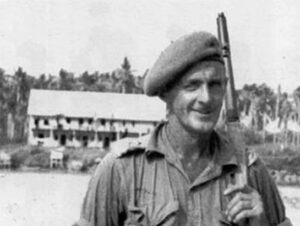 Soldiers everywhere have varied backgrounds, but maybe more so during World War I and World War II, as well as wars in which there was a draft. Robert Kerr “Jock” McLaren was a veterinarian by trade, but during his service with the Second Australian Imperial Force, he also became a feared guerrilla fighter who ran missions against the Japanese. I suppose that, while a veterinarian doesn’t work on humans, possessing certain skills would be important in certain situations. McLaren spent countless hours, days, and weeks in the jungles, and after one such assignment, his medical skills suddenly became urgently needed…on himself. McLaren found himself faced with surgery on himself, or certain death. So, in order to save his own life, McLaren set about to remove his own appendix…in the jungle, with a pen knife, two spoons, and coconut fibers.
Soldiers everywhere have varied backgrounds, but maybe more so during World War I and World War II, as well as wars in which there was a draft. Robert Kerr “Jock” McLaren was a veterinarian by trade, but during his service with the Second Australian Imperial Force, he also became a feared guerrilla fighter who ran missions against the Japanese. I suppose that, while a veterinarian doesn’t work on humans, possessing certain skills would be important in certain situations. McLaren spent countless hours, days, and weeks in the jungles, and after one such assignment, his medical skills suddenly became urgently needed…on himself. McLaren found himself faced with surgery on himself, or certain death. So, in order to save his own life, McLaren set about to remove his own appendix…in the jungle, with a pen knife, two spoons, and coconut fibers.
McLaren was just a teenager during World War I, when he served with the 51st (Highland) Division of the British Army. Because he was so young then, it’s unlikely that he saw combat on the Western Front. Nevertheless, his name is found on the rolls from his division’s time in France in 1918. That made people wonder if he participated in fighting during the Spring Offensive. Following the war, McLaren returned to 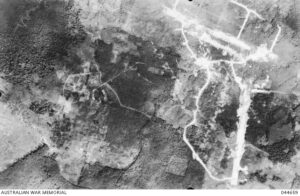 Scotland and completed training to become a veterinarian. He then moved to Queensland, Australia, where he worked as a veterinary officer in Bundaberg.
Scotland and completed training to become a veterinarian. He then moved to Queensland, Australia, where he worked as a veterinary officer in Bundaberg.
When World War II began, McLaren volunteered for the Second Australian Imperial Force. McLaren, 39 years old at the time, was assigned to the 2/10th Australian Field Workshops, 8th Australian Division and stationed in Singapore. McLaren spent time in a POW camp and escaped along with two other soldiers. After being tortured and faced with a firing squad, the trio were ultimately returned to their cells. McLaren, along with 1,000 British and Australian soldiers, was later transferred to Borneo and held at the Sandakan camp. He made plans to escape again, this time with a Chinese POW named Johnny Funk. The escape took the men to the large Philippine Island of Mindanao, where they joined the resistance led by American Reserve Officer, Lt. Col. Wendell Fertig. He was later given the chance to return to Australia, but chose to remain a guerrilla.
It was during his time as a guerrilla that McLaren’s appendicitis attack occurred. During one patrol as a 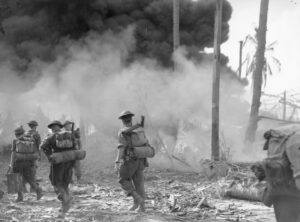 guerrilla, McLaren developed a severe case of appendicitis. He knew enough to know that he was going to have to treat himself, or he would die. So, he performed surgery with just a penknife and two spoons. He stitched the incision with coconut fibers. When asked about the act years later, he said, “It was hell, but I came through alright.” A modest remark for such a remarkable act…in the middle of a Philippine jungle in 1944, without any anesthetic and with only the use of a mirror to see. The operation took 4½ hours. Still, as he said he came through it alright, and he would not be that last person to do surgery on themselves. Nevertheless…remarkable.
guerrilla, McLaren developed a severe case of appendicitis. He knew enough to know that he was going to have to treat himself, or he would die. So, he performed surgery with just a penknife and two spoons. He stitched the incision with coconut fibers. When asked about the act years later, he said, “It was hell, but I came through alright.” A modest remark for such a remarkable act…in the middle of a Philippine jungle in 1944, without any anesthetic and with only the use of a mirror to see. The operation took 4½ hours. Still, as he said he came through it alright, and he would not be that last person to do surgery on themselves. Nevertheless…remarkable.
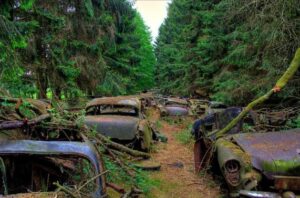
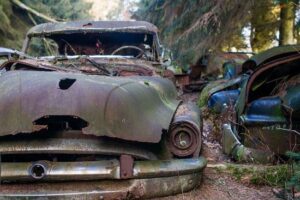 Just outside the little village of Chatillon in Southern Belgium, on top of a tree covered hill, hidden from view, there was a “car cemetery” filled with cars that once belonged to the US servicemen stationed there. No one really knows how the soldiers came to obtain the cars exactly, especially since they were mostly American made cars…meaning they must have been shipped over to Belgium. So, the soldiers who were stationed in Belgium during World War II somehow had cars to drive to get around while they were serving over there.
Just outside the little village of Chatillon in Southern Belgium, on top of a tree covered hill, hidden from view, there was a “car cemetery” filled with cars that once belonged to the US servicemen stationed there. No one really knows how the soldiers came to obtain the cars exactly, especially since they were mostly American made cars…meaning they must have been shipped over to Belgium. So, the soldiers who were stationed in Belgium during World War II somehow had cars to drive to get around while they were serving over there.
Then, once the war was over, the soldiers returned to the United States. I suppose that bringing the vehicles over happened a few at a time, but shipping them back would be a massive undertaking, so it was decided to leave them behind. To me, it would seem like they should have given the cars away. At least that way, people in the area could have a car, when they might not have been able to afford one any other way. Nevertheless, that was not how it was done. The officers in charge decided to leave them in the country and parked them all up at the top of a hill, which was hidden from view. It was left up to the individual soldier whether or not they wanted to have their car shipped to them once they returned home, at their own expense. Not one of them decided to retrieve their car. These days the way things took place in the end, would have very likely cause an international uproar because they basically littered the landscape with junk cars. Of course, they weren’t junk at the time, and I suppose the people of the area could have taken the cars as abandoned. I’m not sure how they would have run when it was finally determined that they were abandoned, and maybe it was decided that it would cost too much. That may be the reason that none of the soldiers ever claimed their vehicles…a cost too heavy and no help in sight.
After many years, the forest was in the process of making very slow work of returning the cars to nature. The stories about the “Car Cemetery” persisted, and possibly complaints too. It was said that American-made cars had been brought by American and Canadian NATO troops to a mechanic in Châtillon. One by one, the cars were driven up a hill, parked, and somehow hidden from the outside world. Eventually, local people added their own old cars too. Possibly the mechanic was to keep them for the soldiers, but after France’s 1966 withdrawal from NATO, he was left “holding the bag” as it were, with hundreds of scrap cars that gradually became overgrown until a television documentary brought the “illegal dump” to light. Finally, the cars were removed and crushed in October 2010.
To date, some of the cars are said to still be there. At one point there was not one but four car graveyards 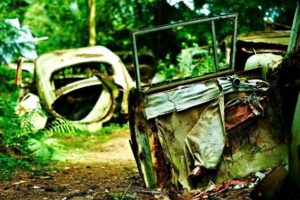
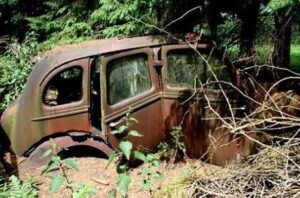 around the village of Chatillon with as many as 500 vehicles. The ones that remain today are only a fraction of the original number of cars. A lot of cars and their parts were stolen by the locals and international car collectors, so maybe some of them have been restored before they were completely lost. Either way, it was a very strange situation.
around the village of Chatillon with as many as 500 vehicles. The ones that remain today are only a fraction of the original number of cars. A lot of cars and their parts were stolen by the locals and international car collectors, so maybe some of them have been restored before they were completely lost. Either way, it was a very strange situation.
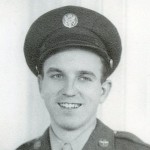
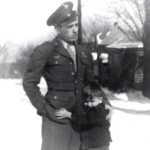 Veteran’s Day is a day about sacrifice and honor, duty and dedication, war and peace, but the day cannot pass for me without thoughts of my dad, and how much I miss him. I know I am not alone in these thoughts, because my sisters also miss him, as well as the rest of our family. My dad Staff Sergeant Allen L Spencer, fought in World War II, serving as flight engineer and top turret gunner on a B-17G Bomber. Dad came home after his successful service, which is why my sisters and I are alive, and why he was a veteran. A veteran is someone who served in the military and came home after.
Veteran’s Day is a day about sacrifice and honor, duty and dedication, war and peace, but the day cannot pass for me without thoughts of my dad, and how much I miss him. I know I am not alone in these thoughts, because my sisters also miss him, as well as the rest of our family. My dad Staff Sergeant Allen L Spencer, fought in World War II, serving as flight engineer and top turret gunner on a B-17G Bomber. Dad came home after his successful service, which is why my sisters and I are alive, and why he was a veteran. A veteran is someone who served in the military and came home after.
Soldiers really are a rare bread, created by God to go out and protect those who cannot protect themselves, even when those they protect don’t know or even care that it is a soldier who has watched over them, their borders, and their homes. The sacrifice a veteran gave was not about dying, although they will do that if it is what is required of them. The sacrifice of a veteran is being away from their family and friends. Some veterans miss out on their babies being born, their wedding anniversaries, weddings of family members, and so much more. They don’t know most of, if any of the people they are protecting, but they go anyway, because they are needed. Lives depend on their loyalty.
These men and women deserve our respect and that is what today is all about. It is a day to remind our veterans that we are grateful for their service, and happy that they were able to return to us and to their family members. War is a horrible thing, and no one really wants to be so far away from home fighting in a war they didn’t start, and one they wish hadn’t ever taken place. Unfortunately, evil exists in our world, and because it does, soldiers are a vital part of our security. God knew that soldiers would have to be people of honor and dedication, with a strong sense of duty and love for their fellow man. They would have to be people of courage and bravery…able to bite back the fear that dwells all around them. God knew the kind of people they would have to be…heroes. And that is what every veteran is, was, and always will be…a hero. Today is Veteran’s Day. It is a day to honor those who have given so much to keep us free. Thank you all for your great service. God bless you…every one of you.
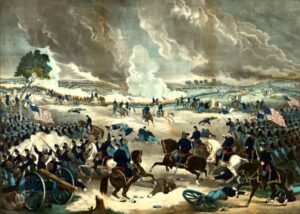
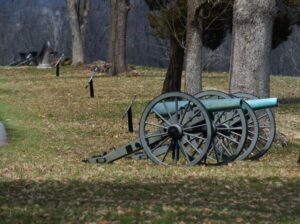 War is a really horrific thing for soldiers to go through, and closure comes in different forms for different soldiers. Returning to the battlefield is a way to find closure for many veterans. It is also a way for solders to keep the friendships they made at a time when their life depended on their fellow soldiers. Countless numbers of men have returned to places like the beaches of Normandy, France to see that place again, where so many lost their lives. Some soldiers didn’t leave the place they fought in their war. Vietnam was that way to a degree.
War is a really horrific thing for soldiers to go through, and closure comes in different forms for different soldiers. Returning to the battlefield is a way to find closure for many veterans. It is also a way for solders to keep the friendships they made at a time when their life depended on their fellow soldiers. Countless numbers of men have returned to places like the beaches of Normandy, France to see that place again, where so many lost their lives. Some soldiers didn’t leave the place they fought in their war. Vietnam was that way to a degree.
The Civil War was unique in that when the veterans decided to have their reunion, they wanted to, of course renew old friendships with those they shared a common bond, but they also wanted to make their reunion a way to bring the north and south back together again. The Gettysburg, Pennsylvania reunion was the largest of these events, and so made headline news around the world. The event took place in 1913 at Gettysburg, Pennsylvania. The Civil War was unique in that all participants were citizens of the United States. Brother fought against brother, and family members against family members. The reunion was a chance to repair those horribly broken relationships for all the men who were still alive at the reunion, which was held on the 50th anniversary of the battle. General H.S. Huidekoper, a Gettysburg Veteran of the 150th PA., was the man behind the idea of making it a gathering of both Northern and Southern Veterans on the 50th Anniversary of the battle. With the state of Pennsylvania, acting as host, $400,000 was set aside to finance the event. The Federal Government added $195,000 and the volunteer services of 1,500 officers and enlisted men. The event was five years in the planning, with Veteran groups throughout the nation helping to make it happen.
The Veterans who were still alive were aging, and because of the reunion, they were able not only to renew the friendships they had, but new friendships were born, and old wounds healed as well. The youngest Veteran, Colonel John C. Clem (known as the Shiloh drummer boy), was 62 years old. The oldest Veteran was 112 years of age. A total of 55,000 veterans attended the event, representing the half million living Confederate and Union Veterans. Of the 55,000 men, 22,103 came from Pennsylvania, and of those, 303 were Confederate. The smallest delegation came from New Mexico…one, a Union Veteran.
The event…one I wish I could have seen, saw over 5,000 tents, covering 280 acres in the middle of the battlefield, where so many had lost their lives. It was almost as if they were there too…giving their approval. Distinguished guests had come to give speeches and presentations. General Daniel Sickles, representing the III Corps at Gettysburg where he lost his leg, was the only corps commander present. On behalf of the battle leaders were the daughter of General Meade and the grandchildren of Generals Longstreet, A.P. Hill and Pickett.
The reunion lasted a full week. The men ate well and swapped stories, cried and laughed. In all 688,000 meals were served by two thousand cooks and helpers. Amazingly and considering the age and health of the Veterans, along with the hot, sultry weather, there were only nine Veterans who did not survive the week, a number well below the normal mortality rate for that day. Perhaps it was the exhilaration of the joining of old friends, reliving days of their youth, hearing the infamous Rebel Yell resound across the battlefield, or reenacting Pickett’s charge to have the Stars and Bars meet the trefoil of Hancock’s II Corps once more that had lengthened their lives.
In the most stunning moment of the event…on the fourth of July at high noon, a great silence fell over the battlefield, as the church bells began to toll. Buglers of the blue and gray prepared to play the mournful tune of Taps one last time. The guns of Gettysburg shook the ground, signaling the end of the weeklong event. When I visited Gettysburg many years later, I was surprised by exactly how that place felt. You could feel the atmosphere there all those years later. It is hallowed ground. You feel like you should whisper…or better yet just be silent. I have never felt that way before, or since.
And though many eloquent speeches were given at Gettysburg that week, none expressed what these Veterans took away from this experience better than a scene witnessed at the train station: “Nearly all of the men had said their good-byes and headed for home. On the station platform a former Union soldier from Oregon and a Louisiana Confederate were taking leave of each other. They shook hands and embraced, but neither seemed 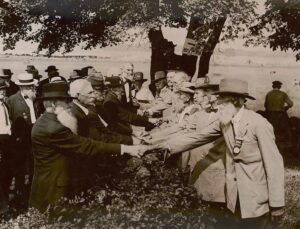
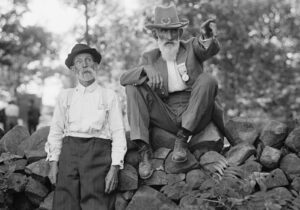 able to find the words to express his feelings. Then an idea seemed to strike both men at once. In a simple act, which seemed to say everything they felt the pair took off their uniforms and exchanged them. The Yankee went home in Rebel gray, the Confederate in Union blue.” The above quote is an excerpt from “Gettysburg: The 50th Anniversary Encampment,” by Abbott M. Gibney, Civil War Times Illustrated, October 1970.
able to find the words to express his feelings. Then an idea seemed to strike both men at once. In a simple act, which seemed to say everything they felt the pair took off their uniforms and exchanged them. The Yankee went home in Rebel gray, the Confederate in Union blue.” The above quote is an excerpt from “Gettysburg: The 50th Anniversary Encampment,” by Abbott M. Gibney, Civil War Times Illustrated, October 1970.
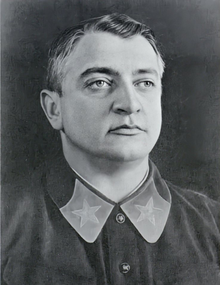
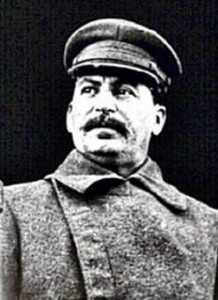 Mikhail Tukhachevsky saw it coming, really. Sometimes it’s rather sad to be right about certain things. Tukhachevsky had been nicknamed the “Red Napoleon,” meaning that he was a popular Soviet military leader in Stalin’s Red Army. Tukhachevsky had no idea just how much more important the ideology would be to Stalin, than loyalty, ability, or anything else.
Mikhail Tukhachevsky saw it coming, really. Sometimes it’s rather sad to be right about certain things. Tukhachevsky had been nicknamed the “Red Napoleon,” meaning that he was a popular Soviet military leader in Stalin’s Red Army. Tukhachevsky had no idea just how much more important the ideology would be to Stalin, than loyalty, ability, or anything else.
After his service in World War I of 1914-1917 and in the Russian Civil War of 1917-1923, from 1920 to 1921 Tukhachevsky commanded the Soviet Western Front in the Polish–Soviet War. He was moving up the ranks, and with the Soviet forces under his command, he successfully repelled the Polish forces from Western Ukraine, driving them back into Poland. Nevertheless, the Red Army suffered defeat outside of Warsaw, and the war ended in a Soviet defeat.
Tukhachevsky went on to serve as chief of staff of the Red Army from 1925 through 1928, as assistant in the People’s Commissariat of Defense after 1934, and as commander of the Volga Military District in 1937. He achieved the rank of Marshal of the Soviet Union in 1935. Still, all of that did not protect him, in fact it put him in more danger, because he was just a little way under Stalin, and that was not going to bode well for him.
Tukhachevsky was arrested in 1936, suspected of being a German spy. The charges included Tukhachevsky’s supposed plot to overthrow Stalin. After he was arrested, the guards coerced a confession out of him. This was at the very beginning of The Great Terror, a term which historians have borrowed from the French Revolution. It refers to the paroxysm of state-organized bloodshed that overwhelmed the Communist Party and Soviet society during the years 1936-1938. It was also known as the Great Purges.
During this time, Stalin actually had over a million of his own soldiers killed for imagined wrongs. Stalin was, in 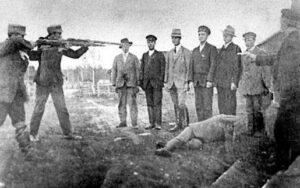 reality, half crazy. He was known to pluck a live chicken, just to see the reaction from his men. It wasn’t a really big stretch to move to killing soldiers or civilians, so the Great Terror wasn’t too far out there for him. As for Tukhachevsky, Stalin sentenced him to death in March 1938. He was executed on June 12, 1937. Even the men who had to judge the soldiers in those “sham” trials, were not free from danger. One of them, Ivan Belov said, “Tomorrow, I shall be put in the same place.” Belov was right. He was arrested on January 7, 1938. He was later executed as well. I can’t imagine how insane Stalin must have been. When you think about it, most of the men and women who were under Stalin’s rule, were too terrified to be disloyal.
reality, half crazy. He was known to pluck a live chicken, just to see the reaction from his men. It wasn’t a really big stretch to move to killing soldiers or civilians, so the Great Terror wasn’t too far out there for him. As for Tukhachevsky, Stalin sentenced him to death in March 1938. He was executed on June 12, 1937. Even the men who had to judge the soldiers in those “sham” trials, were not free from danger. One of them, Ivan Belov said, “Tomorrow, I shall be put in the same place.” Belov was right. He was arrested on January 7, 1938. He was later executed as well. I can’t imagine how insane Stalin must have been. When you think about it, most of the men and women who were under Stalin’s rule, were too terrified to be disloyal.

